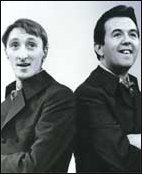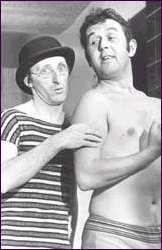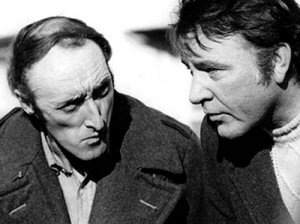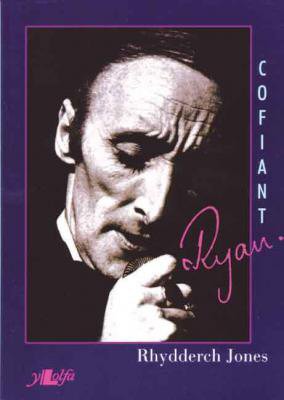RYAN DAVIES
(Glanamman-born comic actor)
In the 1970s, Amman Valley-born Ryan Davies became one of Wales's best known TV actors and personalities before his untimely death in America in 1977 at only forty years of age.
His appearances on both Welsh and English-language TV, usually with his double-act partner Ronnie Williams from the nearby Gwendraeth Valley, ensured the memory of him lived on long after his death. He was one half of Wales's best-loved comedy double-act and the news of his premature death at forty came as a terrible shock to his many fans across the UK. On Friday, April 22, 1977, it was reported that Ryan Davies had died of heart failure after suffering an asthma attack while on holiday in the USA.
The entertainer was visiting friends in Buffalo, New York, when he fell ill, and was taken to Buffalo Mercy Hospital where he could not be revived. He left a wife, Irene, and two children — Bethan, 12, and 10-year-old Arwyn.
Ryan Davies was born in Glanamman, Carmarthenshire, in 1937 and was educated at Llangadog and Llanfyllin. After two years national service in the RAF he went to Bangor Normal College, moving on to London's Central School of Speech and Drama. He started work as a primary school teacher in Croydon in 1960, but five years later was lured into full-time show-business by BBC Wales.
A talented actor, comic and musician Davies quickly established himself as one of the most versatile performers in Wales. In 1967 he teamed up with Cefneithin-born Ronnie Williams, as well as Gillian Thomas and Johnny Tudor, for the Ryan and Ronnie and Jill and Johnny shows before going on to form a duo with Ronnie Williams.
In May 1971 Ryan and Ronnie got their big break from BBC's head of light entertainment, Billy Cotton, Jnr. After visiting Cardiff to watch their Welsh show, Cotton offered them a three-year contract to make an English-language show for the BBC network. As their sketch show ran on BBC1 for three seasons until 1973 the duo became household names, the Welsh Eric and Ernie.
Many of their programmes were recorded at the BBC's ?Pebble Mill studios in Birmingham, and not in Cardiff. The reason for this was that before the M4 motorway was built, it was easier to get Welsh-speaking audiences from North Wales to Birmingham, than from Welsh-speaking west Wales to Cardiff.
Among their best-loved material was the weekly soap sketch, Our House which lampooned life in a terraced valleys' house. Ryan in drag played the archetypal Welsh mam and Ronnie played the father, Will. Myfanwy Talog played the daughter, Phyllis Doris, and Bryn Williams (also known as "Bryn Canary" on account of his singing voice) played the son, Nigel Wyn. Sadly, all four of these actors met untimely deaths. In each episode Nigel Wyn would refer to Ronnie's character as Will, leading to the catchphrase, "don't call Will on your father!" This is a literal translation from the Welsh, "paid a galw Will ar dy dad!"
But in May 1974 their seven-year partnership was brought to an end when Williams succumbed to nervous exhaustion and was advised by his doctor to give up work immediately. "It's a terrible blow," said Davies, eager to dispel any rumours of a rift.
Ryan Davies pictured with fellow Welsh actor Richard Burton while they were filming Under Milk Wood. But solo work held no fears for him. In 1971 he had already spread his wings by appearing alongside Richard Burton, Elizabeth Taylor and Peter O'Toole in the film version of Dylan Thomas's play for voices, Under Milk Wood.
He continued his remarkably successful annual stint in pantomime at Swansea and starred in TV programmes such as Ryan, the classic Welsh language sitcom Fo a Fe, and Poems and Pints. But in December 1975 Davies himself was ordered to rest by doctors, following an asthma attack. Yet despite this, for the last two years of his life, his workload was relentless.
On hearing of his former partner's death, Ronnie Williams said, "In Ryan's case he's given and given and given. He was a man of tremendous energy. He gave to Wales until he had no more to give, completely unselfishly and at the expense of his wife and family. One couldn't have known him all those years without loving and admiring him. We have always been mates. Wales is going to miss him terribly. I am going to miss him more." [Rhodri Owen, The Western Mail, April 17 2002.]
The following item, from a Welsh television series called called Talking Stones, was broadcast in July 2003. Talking Stones takes the viewer on a tour of the graveyards of Wales to investigate the stories of some of the people who are buried there. As narrated by leather-clad biker and Anglican priest Lionel Fanthorpe, the graveyards, tombs and epitaphs tell their various stories, with Ryan Davies being one of those who come under scrutiny:
Front cover of a Welsh-language biography of Ryan Davies by Rhydderch Jones: Cofiant Ryan. Published by Y Lolfa Press, 2003. It was also published in English with the title Ryan: a Biography Here at Hên Bethel chapel graveyard, above Glanamman in the Black Mountain. You don't get many laughs in a graveyard, but I'm by the last resting place of a man who could make an audience smile just by appearing. Ryan Davies was the Welsh entertainment scene in the 1970s. If his life had not been tragically cut short, we'd still be applauding him now.
.....He was born at Mountain View, Glanamman in 1937, and was a teacher for a while. He began his show biz career by doing a turn next door. Ryan performed in some of the biggest theatres in the country, but his first stage performance was here, in the Angel Inn.
.....When his aunt and grandmother went to the prayer meeting, young Ryan went to the pub and performed for pennies. It was good training for many an eisteddfod. Welsh-speaking Wales was very jealous of him. They wanted to keep him to themselves, because they were so proud of him.
.....His talents were very Welsh talents, but then they crossed the border. He changed languages with remarkable facility. When Ryan was partnered with Ronnie Williams, things took off. Ronnie was an actor, announcer and comedian and Ryan had similar talents, but was also a musician and clown. A great double act was born that went on to network television, and dominated light entertainment in Wales for years. In the 1970s, Ronnie Williams suffered a stress-related illness, which broke up the partnership, but Ryan continued at full speed.
.....One Saturday, he presented a morning radio programme. He then went downstairs in Broadcasting House at the BBC, and recorded a children's programme between 9 and 12. He then drove to Swansea for a matinee in the afternoon. He stayed on and did an evening performance between 7.30 and 10. He then drove to Caerphilly to appear in the Double Diamond Club. That's dedication ...
..... Ryan was interested in all entertainment. He was keen to try his hand at directing, but in the meantime he appeared in films, panto, and a new TV show.
..... In 1977, at the age of 40, Ryan took his family for a holiday to America where huge changes of temperature aggravated his asthma. While helping with a barbecue, he collapsed and died shortly afterwards of heart failure.
..... Ryan was full of ideas and plans for the future, never without a project that was either ongoing or about to happen.
..... That was his professional life, but his epitaph reads: "I love thee with the breath, smiles, tears of all my life, and if God choose, I shall but love thee better after death." So he inspired love as well as laughter.[Lionel Fanthorpe: Talking Stones, HTV, 7.30 pm, 22nd July 2003.]
Ryan's son, Arwyn Davies, has followed his father as a musician and actor. He is best known for his role as ne'er-do-well Mark Jones in the BBC's longest-running soap, the Welsh-language drama Pobol y Cwm (People of the Valley), broadcast nightly on S4C.
Ryan Davies is commemorated with a bust in the reception of BBC Cymryu/Wales in Llandaf, Cardiff .
Ryan Davies was always associated with the Welsh ballad Myfanwy which he sang at all his concerts, and whose lyrics, should anyone feel like bursting into song, we reproduce with an English translation by Lynne Davies. All together now ...
Myfanwy (Welsh Lyrics)
Pa ham mae dicter, O Myfanwy,
Yn llenwi'th lygaid duon ddi?
A'th ruddiau tirion, O Myfanwy,
Heb wrido wrth fy ngweled i?
Pa le mae'r wen oedd ar dy wefus
Fu'n cynnau 'nghariad ffyddlon ffol?
Pa le mae sam dy eiriau melys,
Fu'n denu'n nghalon ar dy ôl?Pa beth a wneuthym, O Myfanwy,
I haeddu gwg dy ddwyrudd hardd?
Ai chwarae oeddit, O Myfanwy
 thanau euraidd serch dy fardd?
Wyt eiddo im drwy gywir amod -
Ai gormod cadw'th air i mi?
Ni cheisiaf fyth mo'th law, Myfanwy,
Heb gael dy galon gyda hi.Myfanwy boed yr holl o'th fywyd
Dan heulwen disglair canol dydd.
A boed i rosyn gwridog ienctid
Ddawnsio ganmlwydd ar dy rudd.
Anghofiais oll o'th addewidion
A wnest i rywun, 'ngeneth ddel,
A rho dy law, Myfanwy dirion
I ddim ond dweud y gair "Ffarwel".Composed 1875. Welsh Lyrics: Richard Davies (Mynyddog), (1833 – 1877). Music: Joseph Parry (1841 – 1903).
English translation by Lynne Davies Why is it anger, O Myfanwy,
That fills your eyes so dark and clear?
Your gentle cheeks, O sweet Myfanwy,
Why blush they not when I draw near?
Where is the smile that once most tender
Kindled my love so fond, so true?
Where is the sound of your sweet words.
That drew my heart to follow you?What have I done, O my Myfanwy,
To earn your frown? What is my blame?
Was it just play, my sweet Myfanwy,
To set your poet's love aflame?
You truly once to me were promised,
Is it too much to keep your part?
I wish no more your hand, Myfanwy,
If I no longer have your heart.Myfanwy, may you spend your lifetime
Beneath the midday sunshine's glow,
And on your cheeks, O may the roses
Dance for a hundred years or so.
Forget now all the words of promise
You made to one who loved you well,
Give me your hand, my sweet Myfanwy,
But one last time, to say "farewell".To hear Ryan Davies sing Myfanwy from a live concert, click HERE:




